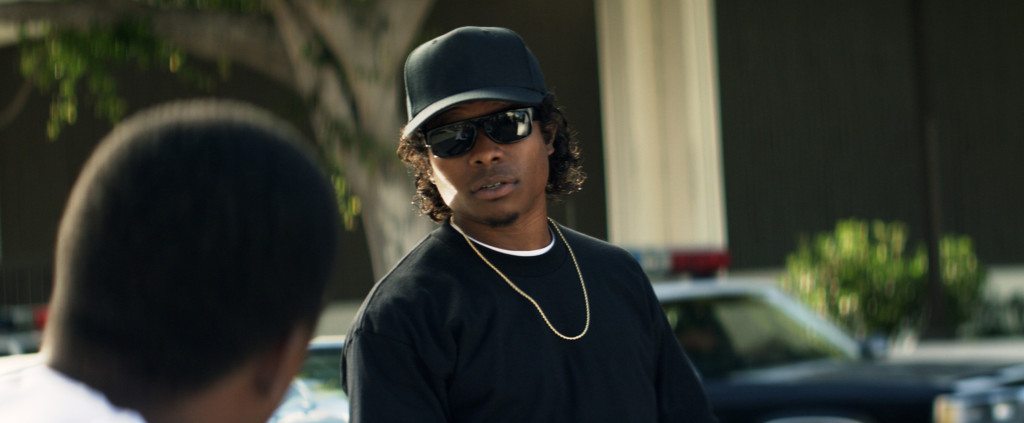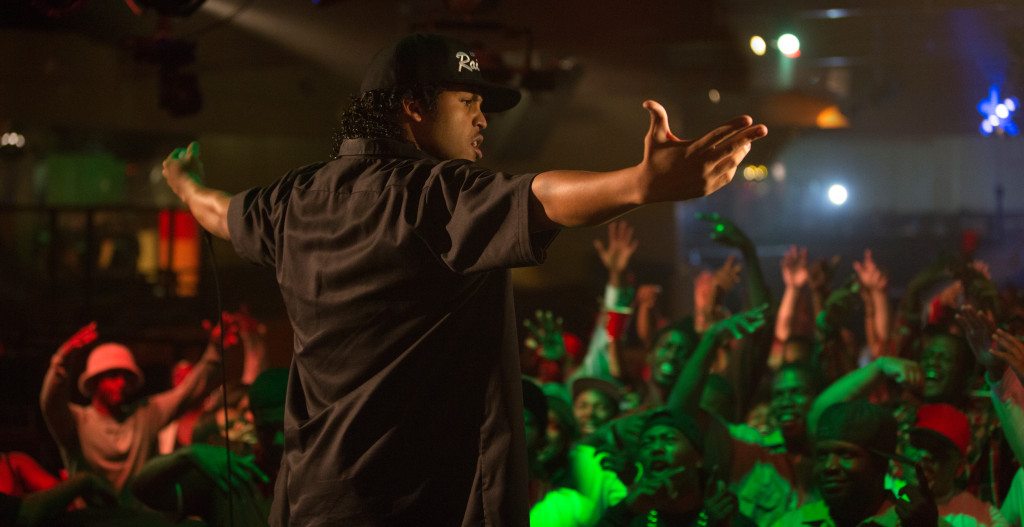Straight Outta Compton
Director: F. Gary Gray
Cast: O’Shea Jackson Jr., Corey Hawkins, Jason Mitchell, Paul Giamatti
Length: 147 minutes
Country: USA
—
This NWA biopic may be both overlong and overstuffed, and may have little to offer in terms of narrative or cinematic invention; but its message is so readily immediate and, in a sense, heartfelt, that I found it almost impossible to dislike.
The story goes that five young boys from Compton, California – one of the most dangerous cities in the state – came together to form a unique music group, that would go on to become perhaps the most influential movement in West Coast hip-hop ever, and achieve an astonishing level of mainstream success. That their origin story is so turbulent is hardly a surprise considering the unmatched personality and talent of its line up; the fact that names such as Eazy-E, Dr. Dre, Ice Cube and even MC Ren have such powerful connotations pay tribute to the fact that it was such an absurd moment of history, an impossible matchup of unique voices that, somehow, harmonized. (It’s as if Jimi Hendrix, BB King, Ry Cooder and Eric Clapton met in a bar one day and decided to make an acoustic album in their parents’ basement.)
Again, the journey itself isn’t particularly inventive. We go through a checklist of biopic clichés: the pre-fame gigs in dingy bars and clubs; the magic moment in the recording studio; the signing of the dodgy manager; the record deal, the initial surge of success and the tour; then the falling out over money, the splitting apart, and the final attempt at reconciliation – in this case, marred by the tragic death of Eazy-E from AIDs in 1995.
Yet Straight Outta Compton does what the best biopics do, in that it captures the spirit of the music.
Yet Straight Outta Compton does what the best biopics do, in that it captures the spirit of the music. It is perfectly aware that the first three tracks on NWA’s first album (called “Straight Outta Compton”, oddly enough) are among the most memorable explosions of musical artillery fire in recorded history. The second track in particular – the radio unfriendly “Fuck Tha Police” – came to be adopted as the national anthem for a disenfranchised black America which, in the wake of the disgraceful Rodney King trial, was at a dangerous tipping point. (A memorable section of the film shows the 1992 Los Angeles Race Riots, where the boys see their lyrics scribbled on the walls.) The film is also unafraid to defend NWA from controversy – the complaints about lyrics glamourising drugs and violence are explained to be their art reflecting their harsh reality, and acting as almost a form of non-violent protest, of being unafraid to say what you want to say even in the face of systematic oppression.
Having said that, their casual misogyny is pratically given a free pass – even played for jokes at one point – and there’s an uncomfortable sense that, with Ice Cube and Dr. Dre attached as producers, they are favourably re-writing their own history. I’m mostly referring to the omission of Dr. Dre’s several domestic abuse charges that, apparently, “didn’t fit the narrative.” It may be true that this would have made the audience lose some sympathy for the character, but its omission is a mistake – even if they have come a long way, these guys weren’t necessarily heroes, and nothing can really change that. It’s the same story with Jerry Heller; he may well have been a greedy record producer, but the prejudice against him that both Dre and Cube have elsewhere made vocal almost works against the narrative at points (though the always excellent Paul Giamatti tries his best to give him a sad, sympathetic side, particularly in his final scene.)
But it’s a story that, a year on from Michael Brown and Eric Garner, still feels relevant, and still burns at 200 degrees, long after you thought the band’s fire had gone out.
Your enjoyment will hinge on your interest in the source material – and how interested you are in seeing the origins of Tupac’s “California Love”, or Suge Knight’s bullying management of Death Row Records – and it is terribly, terribly long. But it’s a story that, a year on from Michael Brown and Eric Garner, still feels relevant, and still burns at 200 degrees, long after you thought the band’s fire had gone out.



Comments